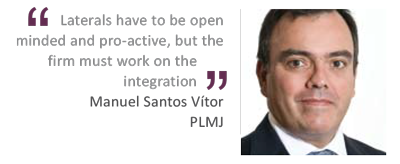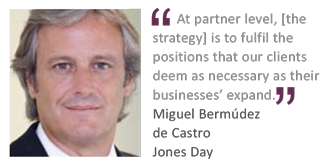Special focus: Legal recruitment 2015: Talent spotting
With workflow increasing at law firms in Spain and Portugal, many are looking to increase the size of their teams in the coming year as the battle for the best candidates intensifies
A pipeline of transactional activity has led to a more optimistic economic outlook and law firms across Iberia are stating their intention to increase headcount in 2015. Indeed, last year, a number of firms said they experienced a growth in personnel of more than 20 per cent. This represents a contrast to the restrained approach to recruitment in recent years.
Jones Day´s Madrid-based partner Miguel Bermúdez de Castro says the firm will be increasing the size of its office as “we open new practices and grow existing practices”. He adds that the firm will be looking to expand in a number of areas including banking and M&A. “If we find a lawyer with a new set of skills or speciality that we don´t currently offer, and that we see a real need for, we are keen to hire.”
Lois Thornton, a recruitment consultant at Taylor Root, confirms that, while recruitment across Spain had previously been very slow due to the global financial crisis, firms are now increasingly making lateral hires in response to a “generally improving market and in an effort to ensure that the relative experience levels of their teams is well balanced”.
Filipa Mendes Pinto, a partner at recruitment firm FIND in Lisbon, agrees with this analysis. “In 2014, firms showed a greater will to make lateral hires,” she says. “The reasons included: the feeling of some economic recovery; the lack of junior lawyers, namely in corporate/M&A and IP, due to the strangulation of the recruitment of trainees; the need to have new teams that strategically had been identified as relevant for the repositioning of the firm in the market; and normal replacement moves.”
Recruiters and lawyers identify M&A, tax, real estate and dispute resolution as the practice areas in which lateral hires are most likely to take place. Historically, many firms have handled their human resources (HR) matters themselves with a focus on hiring younger lawyers. Adela García de Tuñón, Hogan Lovells’ HR manager in Madrid, explains: “Normally we cover any vacancies internally. Our HR team is specialised in the selection and hiring process and knows the market well. Also, we believe our own professionals are the best ambassadors for transmitting and promoting our culture.”
This organic approach is mirrored at Uría Menéndez, where general secretary Icíar Rodríguez Inciarte says the firm very rarely uses legal recruitment agencies, preferring to recruit young law graduates from university and postgraduate courses. “Our strategy is to recruit the best young talent, to train them in-house and to offer them a clear career plan,” he remarks. “The firm has its own recruitment department which coordinates presentations, open-day sessions, attends job fairs, coordinates the recruitment process, and organises written tests, interviews and our summer trainee programme.” 
It is a similar scenario in Portugal. João Caiado Guerreiro, managing partner at Caiado Guerreiro, comments: “We want to keep the Caiado Guerreiro ´one team spirit´ so we normally recruit trainees. That also marries well with our organic growth strategy.” Meanwhile, Manuel Santos Vítor, managing partner at PLMJ, says his firm´s trainee recruitment strategy involves a dedicated committee, led by three senior partners, with an additional support team that includes a HR advisor working exclusively in the legal market to recruit talent.
Firms turning to recruiters
The legal recruitment market is getting more intense and when sourcing candidates, especially mid-to-senior level lawyers, some firms do not solely rely on personal relations and in-house expertise, instead turning to recruitment agencies to manage the high volume of candidates and filter applications. Bermúdez de Castro says his firm’s strategy involves the use of personal relationships as well as recruitment agencies. “At partner level, [the strategy] is to fulfil the positions that our clients deem as necessary as their businesses expand,” he says. “In particular, if we find a lawyer with a new set of skills or specialty that we don’t currently offer, and that we see a real need for, we are keen to hire. We do not take on many graduates as we work closely with select universities to ensure we get the best students to come and work for us as trainees during their studies. Many of our partners hold academic positions and can identify good juniors.”
Thornton observes that the main complaint from HR departments at smaller to medium-sized law firms, however, is that they felt obliged to hire candidates referred by partners, despite them not necessarily being an ideal fit in terms of their experience. “As the market grows again, this model becomes unsustainable and in order to ensure that they get the best possible people in a busier market, external recruitment agencies are once again becoming the preferred means of accessing a larger, international pool of prospective hires,” she adds.
 Too many CVs
Too many CVs
Alejandro Kress, associate director and Iberia head at Shilton Sharpe Quarry, highlights “big data” as an additional factor, specifically too much information, too many CVs and too many emails. “We need to cope with time management, hence HR professionals are also in dire need of search firms who have big databases and have the tools to introduce fewer candidates with the right skills set,” he comments. Unlike some candidates who may be applying to firms directly, recruiters claim they often have an understanding of the specific nature of the legal market in question, as well as knowledge of the firms, and practice areas, that are currently expanding. Consequently, recruiters say they are often able to better match candidates with suitable destinations.
Whether the sourcing of candidates is done internally or externally, lawyers and recruiters say there are common qualities that most firms are seeing. Kress expects firms will want to grow by enhancing current client relationships and creating new ones with lateral hires.
Sometimes they don´t fit
Sancho Peña Oriol, a Madrid-based recruiter at Acheron Partners, expands on the point, believing that firms usually want a client portfolio. “Of course, this is a plus and not a must,” he adds. “The personal fit is the most important consideration. The hiring law firm wants to keep the hired lawyer as long as possible. The lawyer usually comes with a different philosophy and sometimes has a hard time getting used to the new job, sometimes they don´t fit and have to leave the firm.”
Santos Vítor stresses that, while PLMJ prefers internal growth, new laterals have to be open minded and pro-active, but the law firm – and more specifically the team that will accommodate the newcomer – also has to work on the integration process.
Peña Oriol says that recruiters also sometimes have to convince lawyers that a lateral move will be beneficial: “Law firms want the best lawyers and they are highly valued within their current firms. The recruiter´s work is not only to propose a new project to the lawyer, we also have to make him or her understand why the change is going to be good for their career.” Filipe Romão, a partner at Uría Menéndez in Lisbon, adds that one of the biggest challenges is being able to motivate young talent and offer a career opportunity that allows for a satisfactory work-life balance.
 Partnership no longer the main goal
Partnership no longer the main goal
Mendes Pinto believes these sensitivities make lateral hiring a strategic issue because firms have concluded that basing growth purely on the development of their lawyers’ careers would not be sufficient. “First, young lawyers don’t want to stay in the same firm forever, second, partnership is no longer the principal goal to achieve,” she says. “Although there are still many exceptions, the truth is that many lawyers, even males, rather prefer to have a work-life balance instead of spending the most important years of their lives struggling for a position that has become more difficult to get.”
Thornton points out that, in general, law firms in Spain – unlike, say, London firms – are more interested in assessing candidates´ experience rather than placing a greater emphasis on whether the candidate has worked for a firm with a large “brand name”. She adds: “They [Spanish firms] are not willing to compromise on the quality of the experience that the individual has built-up. Rather than making the assumption that a lawyer knows what he or she is talking about because they were at an international firm previously, firms in Spain spend more time talking through the types of transaction that prospective hires have been involved in and what their involvement actually constituted, to get a feel for whether there is a synergy with the position that they have in mind.”
Lillian Bishop of UK recruiter Armstrong Bishop, which specialises in in-house lawyer recruitment, says it is important to consider the best way of reaching available candidates. She adds: “If not locally then companies may need to look abroad for candidates who are open to relocating. Companies need to be aware of what are the key selling points of their opportunity – including the package – to compete in a competitive market.”
Rodríguez Inciarte concludes that as the market gets increasingly competitive, international and domestic firms require candidates with many different skills and attributes. He adds: “We need candidates with a very good command of the English language, a sound knowledge of the law, and soft skills such as business acumen, an understanding of the client’s sector and their needs, as well as social skills and efficiency.












